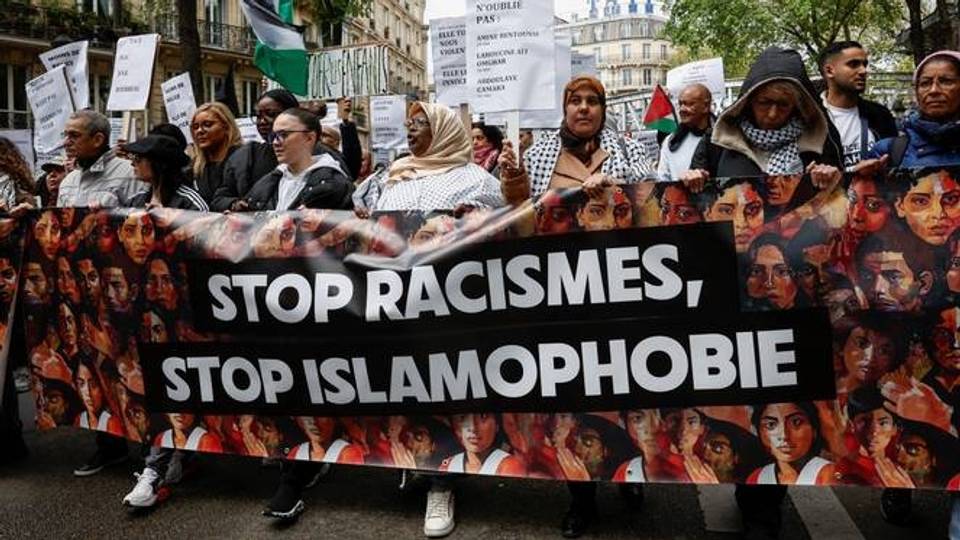Sport
Dollar
38,1969
0.24 %Euro
44,1954
1.57 %Gram Gold
4.159,4500
2.03 %Quarter Gold
6.767,1400
0 %Silver
40,3000
0.94 %A year after France's top court acknowledged systemic racial profiling, discriminatory practices persist, disproportionately targeting Black and Arab communities.

By
Zeynep Conkar
Paris, the so-called city of romance and lights, has an utterly dangerous dark side, where people with dark skin or Arab origin are tormented, labelled as ‘outsiders’ and not French enough.
Black and Arab individuals are frequently stopped by the French police, asked for identification, and subjected to frisking and even strip searches – all because of their skin colour and ethnic or religious background.
Last year, France's highest administrative court, the Council of State, recognised that racial profiling by law enforcement was a systemic issue rather than isolated incidents.
The government is yet to wake up to this stark reality and take serious measures to make its minorities feel safe.
Dr. Amina Easat-Daas, a Political Scientist at De Montfort University and an author, tells TRT World that calls from international organisations such as the UN to limit racial profiling have gone unheeded.
“Racial profiling by law enforcement cannot be viewed in isolation but must be understood as a symptom of larger systemic issues,” Easat-Daas says.
“Evidence suggests that French racialised communities are twenty times more likely to be stopped by police.”
Police identity checks, particularly targeting Black and Arab youth and even teenagers, often escalate into violence.
One recent harrowing example is the fatal shooting of Nahel, a 17-year-old of Algerian descent, during a traffic stop last year. Such incidents have eroded trust between law enforcement and marginalised communities, compounding a sense of injustice.
The broader pattern
Racial profiling stems from the long-standing issue of institutional inequality plaguing France and other parts of Europe.
A survey by the Representative Council of France's Black Associations (CRAN) revealed that 91 percent of Black respondents in mainland France reported experiencing racial discrimination, with 85 percent citing their skin colour as a direct cause.
These issues are most prevalent in public spaces and workplaces, with significant barriers also reported in housing and education.
Muslims face similar challenges.
According to a report by the EU Agency for Fundamental Rights (FRA), nearly half of Muslim respondents across Europe have experienced racism in daily life, often tied to their clothing, ethnic background, or beliefs, despite varying professional and social realities across the region.
More than half of Europe’s 44 million Muslims born on the continent report racial discrimination when applying for jobs, suggesting unequal treatment compared to individuals with comparable language skills and qualifications.
Women wearing visible religious symbols, such as headscarves, face even higher levels of bias in the workplace, with 45 percent experiencing discrimination in professional environments, a significant increase from 31 percent in 2016.
Muslims also encounter notable obstacles in the housing market, with roughly 35 percent reporting discrimination while attempting to rent or buy property, up from 22 percent in 2016, according to the EU Agency for Fundamental Rights (FRA).
The FRA attributes this rise in anti-Muslim sentiment to conflicts in the Middle East and dehumanising rhetoric used by politicians and far-right figures across the continent.
Easat-Daas offers a similar viewpoint, arguing that these discriminatory practices are deeply entrenched in global racist frameworks rooted in colonialism.
“The pseudo-legitimisation of the dehumanisation of Black and Arab/Muslim populations through racist structures allows law enforcement to disproportionately target racialised groups seemingly without consequence,” she says.
Ban on ‘ostentatious’ faith symbols
The effects of racial profiling extend beyond policing. Easat-Daas highlights how systemic racism impacts marginalised communities on multiple levels.
“In France, racialised communities are likely to find themselves excluded from education, such as through the ban on ostentatious faith symbols in schools, which disproportionately affects Muslim women. They are also excluded from employment and housing through profiling,” she says.
These forms of exclusion have deep social and psychological effects, further entrenching cycles of inequality. Only a fraction of victims file complaints due to trust deficit with the judicial system.
Drawing parallels with high-profile cases like the murder of George Floyd, a Black man, in the US or the police killing of Adil, a 19-year-old Moroccan boy, in Belgium, Easat-Daas says France’s racial profiling is a deep seated problem that needs to be tackled head on.
“These instances highlight how Black men and Arab/Muslim men disproportionately bear the brunt of racist policing globally, often with grave consequences, including loss of life,” she says.
The author, Zeynep Conkar, is a deputy producer at TRT World.
Comments
No comments Yet
















Comment